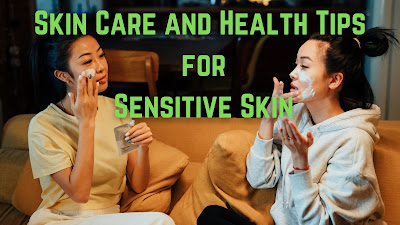Sensitive skin can be challenging to manage, especially if you're not sure what's causing the reaction. From harsh chemicals in products to environmental triggers, many factors can irritate sensitive skin. Fortunately, there are steps you can take to soothe your skin and keep it healthy. In this article, we'll discuss some skin care and health tips for sensitive skin.
Choose Gentle Products
When you have sensitive skin, it's crucial to choose gentle, non-irritating products. Look for skincare products that are labeled "hypoallergenic" or "fragrance-free," as these are less likely to cause a reaction. Avoid using products that contain harsh chemicals, such as sulfates, parabens, and fragrances, which can dry out or irritate your skin.
Moisturize Regularly
Moisturizing your skin is essential, especially if you have sensitive skin. Use a gentle, fragrance-free moisturizer every day to help soothe and hydrate your skin. Look for ingredients like glycerin, ceramides, and hyaluronic acid, which can help repair your skin's barrier function.
Protect Your Skin from The Sun
Exposure to the sun's harmful UV rays can cause sensitive skin to become red, itchy, and irritated. It's important to protect your skin from the sun by wearing protective clothing, a broad-spectrum sunscreen with an SPF of 30 or higher, and staying in the shade during peak sunlight hours.
Avoid Hot Water
Hot water can strip your skin of its natural oils and cause it to become dry and irritated. When washing your face or taking a shower, use lukewarm water instead of hot water. Avoid taking long, hot showers, as they can be especially drying.
Be Gentle When Cleansing Your Skin
When you're washing your face or body, be gentle and avoid rubbing your skin aggressively. Use a gentle, fragrance-free cleanser and a soft cloth or your hands to cleanse your skin. Avoid using harsh exfoliants or scrubs, as they can be too abrasive for sensitive skin.
Consider Your Diet
The food you eat can affect your skin's health. Eating a balanced diet that's rich in fruits, vegetables, and whole grains can help keep your skin healthy. Consider adding foods that are high in antioxidants, such as berries and leafy greens, which can help protect your skin from environmental stressors.
Manage Stress
Stress can affect your skin's health and make it more sensitive. To keep your skin healthy, try to manage stress through activities like yoga, meditation, or deep breathing exercises. Make time for self-care, such as taking a relaxing bath, reading a book, or doing something else that you enjoy.
In conclusion, sensitive skin can be challenging to manage, but by following these skin care and health tips, you can help soothe and protect your skin. Remember to choose gentle products, moisturize regularly, protect your skin from the sun, avoid hot water, be gentle when cleansing your skin, consider your diet, and manage stress. With the right care, your sensitive skin can stay healthy and beautiful.
---------------------------------------------------------------------------------------------------------------------------
Skin Care Product >>> https://bit.ly/3ltbZJV
.jpg) |
| Order Now |

Comments
Post a Comment